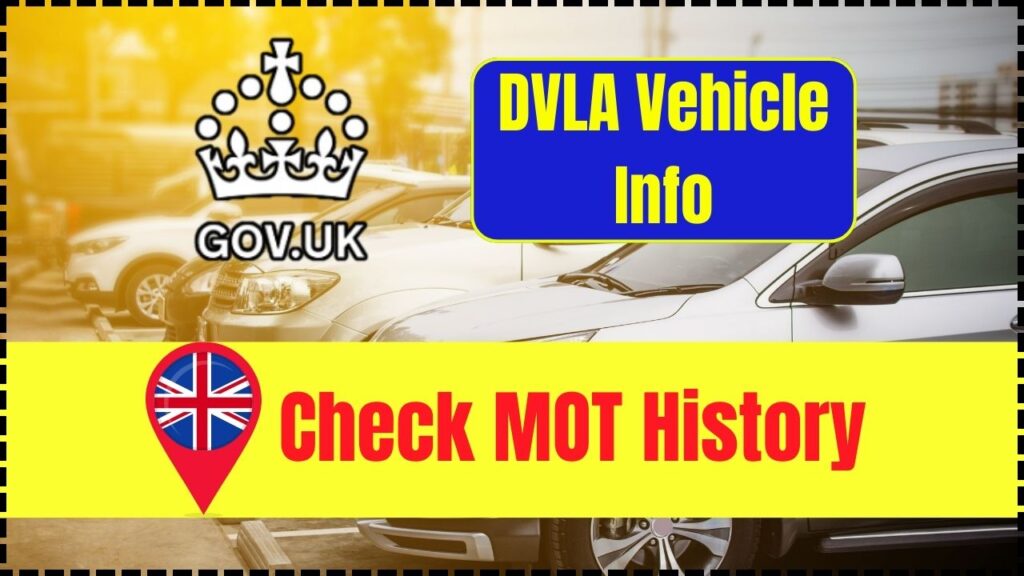DVLA Vehicle Info: Keeping your vehicle in top shape isn’t just about regular maintenance; it’s also about staying on top of legal requirements like MOT tests and vehicle tax. Fortunately, the Driver and Vehicle Licensing Agency (DVLA) offers quick and easy online tools to help you check your vehicle’s MOT history, tax status, and more. In this guide, we’ll walk you through how to access and understand this vital information, ensuring you stay compliant and avoid hefty fines.
DVLA Vehicle Info
Staying informed about your vehicle’s MOT history and tax status is essential for legal compliance, safety, and financial well-being. Utilizing the DVLA’s online services makes this process quick and hassle-free. By regularly checking your vehicle’s status and setting up reminders, you can drive with peace of mind, knowing you’re meeting all necessary legal requirements.

| Feature | Details |
|---|---|
| Services Available | Check MOT history, vehicle tax status, and insurance status |
| Required Information | Vehicle registration number (number plate) |
| Access Platforms | Online via GOV.UK or various free third-party services |
| Potential Penalties | Up to £1,000 fine for driving without valid MOT or tax |
| Additional Benefits | Free reminders for MOT and tax renewals |
| Official Source | GOV.UK – Vehicle Information Services |
Why Regularly Check Your DVLA Vehicle Info?
Regularly checking your vehicle’s MOT history and tax status is crucial for several reasons:
- Legal Compliance: Driving without a valid MOT certificate or vehicle tax is illegal and can result in fines up to £1,000.
- Safety Assurance: An up-to-date MOT ensures your vehicle meets safety standards, protecting you and other road users.
- Financial Savings: Avoid unexpected fines and identify potential issues before they become costly repairs.
How to Check Your Vehicle’s MOT History?
The DVLA provides a straightforward online service to check your vehicle’s MOT history. Here’s how you can do it:
- Visit the Official MOT History Service:
- Navigate to the GOV.UK MOT history page.
- Enter Your Vehicle’s Registration Number:
- Input the number plate details to access the MOT records.
- Review the MOT History:
- You’ll see:
- Pass or Fail Status: Understand whether your vehicle passed or failed previous tests.
- Mileage Records: Track mileage over time to spot inconsistencies.
- Advisories and Failures: Identify issues noted during tests that may need attention.
- You’ll see:
How to Check If Your Vehicle Is Taxed?
- Access the Vehicle Tax Checker:
- Go to the GOV.UK vehicle tax check page.
- Input Your Registration Number:
- Enter your vehicle’s number plate to proceed.
- View Tax Status:
- The service will display:
- Tax Status: Confirm if your vehicle is currently taxed.
- Expiry Date: Know when your current tax period ends.
- The service will display:
Additional Services: Insurance Status and More
Beyond MOT and tax checks, it’s wise to verify your vehicle’s insurance status:
- Check Insurance Status:
- Use the askMID service to ensure your vehicle is insured as required by law.
- Set Up Tax and MOT Reminders:
- The DVLA offers free reminders to help you stay on top of renewals:
- Vehicle Tax Reminders: Sign up via your Driver and Vehicles account to receive email or text notifications before your tax expires.
- MOT Reminders: Register on the GOV.UK MOT reminder page for timely alerts.
- The DVLA offers free reminders to help you stay on top of renewals:
Tips for Maintaining Compliance
- Check Regularly: Make it a habit to check your vehicle’s MOT and tax status at least once every three months.
- Keep Documents Safe: Store your MOT certificate, insurance documents, and tax receipt in a safe place.
- Report Changes Promptly: If you sell your vehicle or change your address, update your details on the DVLA website.
Everything You Need to Know About the UK MOT Test in 2025
New MOT Rules Explained: What Drivers Need to Know
DVLA Vehicle Check—Find Out Hidden Details About Any Car Instantly!
Frequently Asked Questions (FAQs)
1. What happens if I drive without a valid MOT?
Driving without a valid MOT certificate is illegal and can result in a fine up to £1,000. Additionally, without a valid MOT, your insurance may be invalidated.
2. Can I tax my vehicle without a valid MOT?
No, you must have a valid MOT certificate to tax your vehicle. If your MOT has expired, you’ll need to pass an MOT test before renewing your vehicle tax.
3. Are there any exemptions to vehicle tax?
Yes, certain vehicles are exempt from vehicle tax, including those used by disabled persons, historic vehicles (over 40 years old), and electric vehicles. However, you must still register the vehicle as taxed.
4. What should I do if I no longer use my vehicle?
If your vehicle is off the road and not in use, submit a Statutory Off Road Notification (SORN) to the DVLA to avoid paying vehicle tax during this period.







